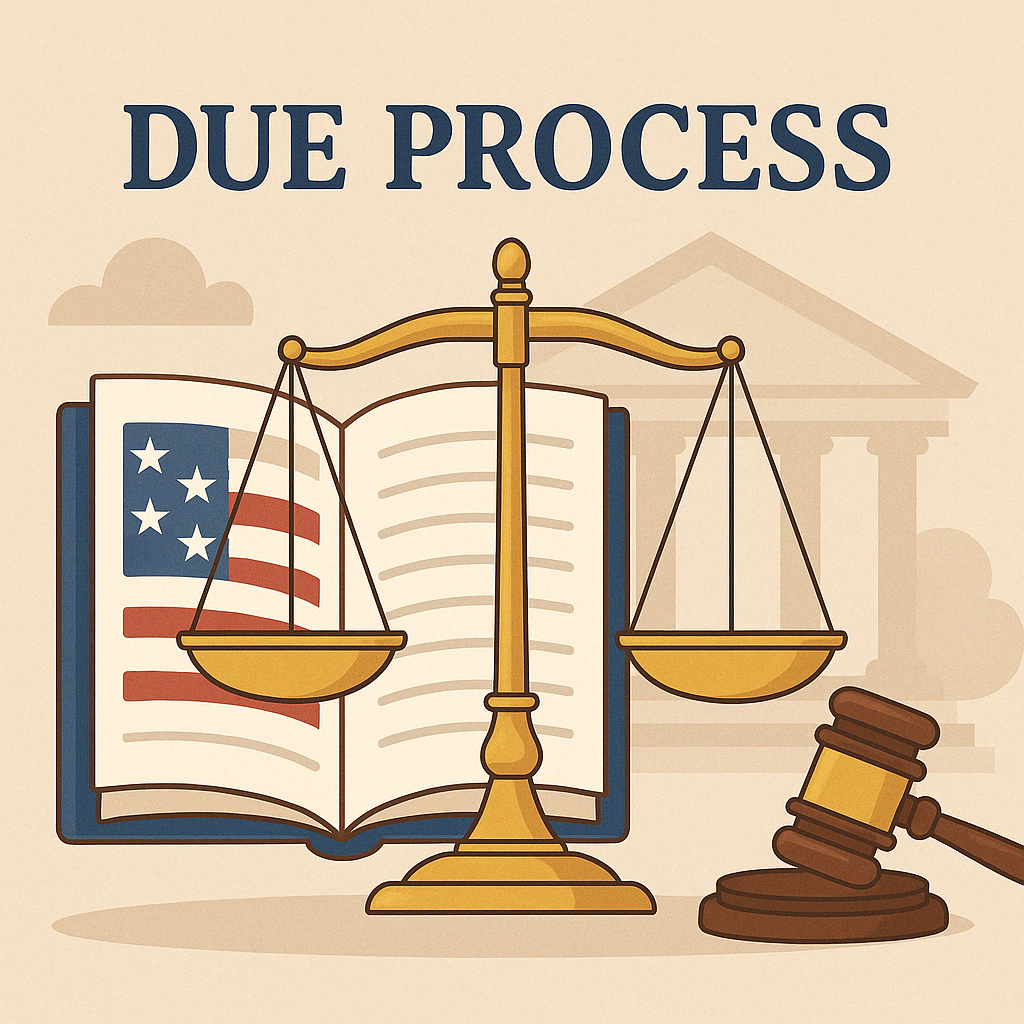Let’s talk about something that doesn’t usually trend on X (although I deleted my account months ago) Instagram and Tiktok but absolutely should: due process. Sounds dry, right? But stay with me—this one concept is the reason you can’t just be thrown in jail because someone doesn’t like your haircut or the way you vote. Or simply because you or a family member was picked up by ICE over a supposed immigration status. Like Kilmar Abrego Garcia.
So what is due process?
In plain English, due process means the government has to follow fair rules before it can take away your life, freedom, or property. It’s a right guaranteed by the Constitution (yep, that old document still matters), and it’s the backbone of the entire American judicial system.
The Fifth and Fourteenth Amendments to the U.S. Constitution guarantee due process of law, protecting individuals from arbitrary government actions that could deprive them of life, liberty, or property. This principle ensures fairness and procedural safeguards before the government can take such actions
It means, you can’t be charged with murder and sentenced to death with out a fair trail. The government has to prove, with discovery, to a jury of your peers that you committed a crime. Even Luigi Mangione, who is begin charged with murdering the CEO of an insurance company has the right to due process.
Breaking it down: What does due process actually do?
There are two flavors of due process:
- Procedural Due Process – This is about how the government acts. Think of it like your legal safety net: you’re entitled to a fair trial, a chance to defend yourself, and proper notice before anything major goes down.
- Substantive Due Process – This one protects your fundamental rights—like the right to privacy or to raise your kids how you see fit. Even if the government follows all the right procedures, it still can’t mess with certain rights just because it feels like it.
In other words, due process is the reason we have courtrooms and not just kangaroo courts. Now grants we can speak for hours on the concept of fair trail. We can dig through massive examples of who specifiable and what monetary demographics get fair trails. But that is not the point here.
Due process is a basic fundamental constitutional right. Even the Supreme Court of The United States agrees.

Why You Should Be Worried When It’s Ignored
Imagine being accused of a crime, and instead of getting a trial, you’re immediately sentenced. No lawyer. No evidence. No defense. Just done. One can literally be picked up off the streets and sent to a Salvadorian prison. Paid for by tax payer money. Well there’s no need to image because that is the case of Kilmar Abrego Garcia.
When the government refuses to follow due process, especially after the judicial branch tells them to, it’s a big red flag. Our government works with checks and balances. (to which the current administration is flaunting with how far they can go) If one branch says, “Hey, this is unconstitutional,” and another branch says, “Nah, we’re doing it anyway,” that’s a breakdown of democracy.
It’s not just about a singular case. It’s about precedent. If the government gets away with ignoring due process once, what’s to stop them from doing it again? And next time, it might not be someone else—it might be you or someone you care about.
Why You Should Care (Even If You’re Not in Trouble)
Even if you’ve never had a run-in with the law, due process still protects you. It guarantees that your rights mean something—not just on paper, but in practice. When the rules get tossed aside, nobody’s safe. Today it might be someone accused of a crime. Tomorrow, it might be a protester, a journalist, a parent, or a neighbor.
The Bottom Line
Due process isn’t just a legal concept—it’s your shield against government overreach. It’s what keeps the scales of justice balanced. When it’s respected, we all benefit. When it’s ignored, especially by those in power, it chips away at our freedom and democracy, one case at a time.
So the next time you hear about a court ruling being “ignored” or “overruled” by executive action, pay attention. It’s not just politics—it’s your rights on the line.